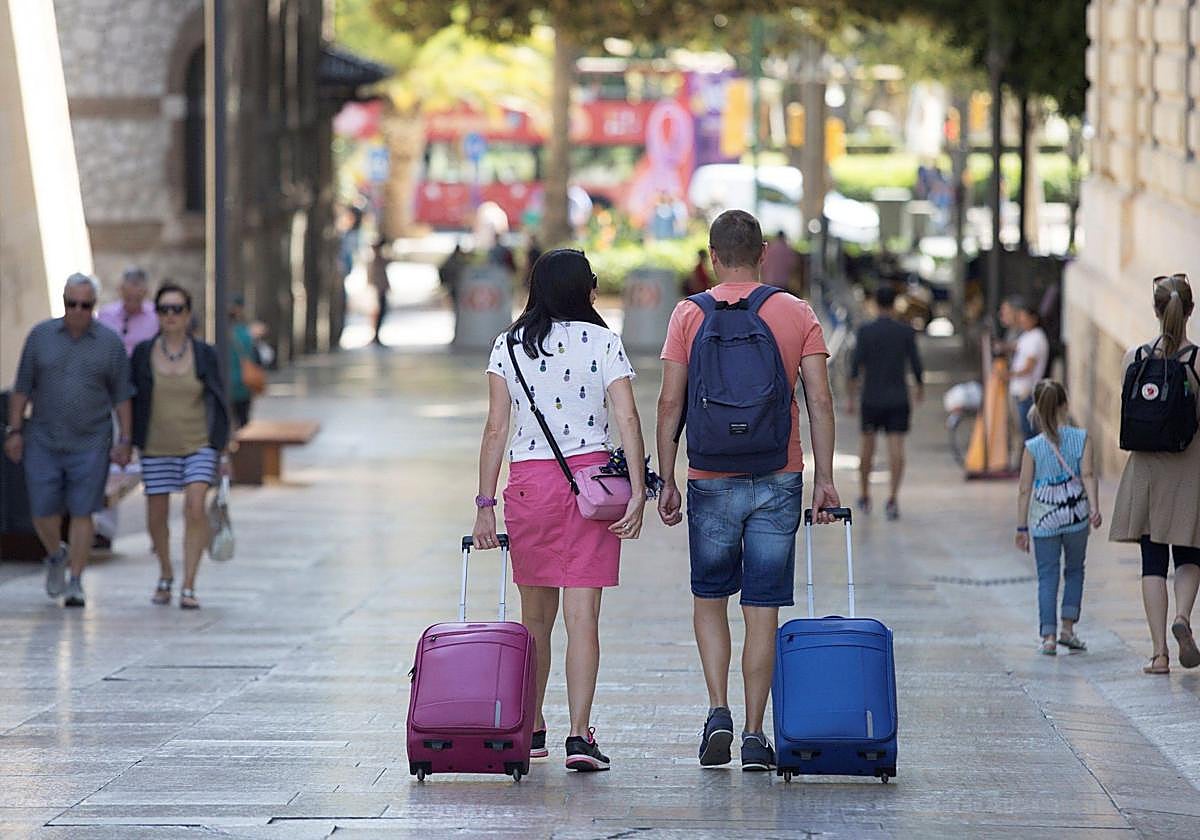Are the new measures putting the brakes on licensing tourist flats in Malaga city?
While in the province as a whole the tourist licence registrations continue to grow, the city recorded a slight decline in the last month after the ban on new licence approvals in 43 city hotspots
Malaga city's new regulations concerning holiday rental properties came into force on 14 January, preventing the granting of new licences in 43 areas of the city where these properties represent or exceed 8% of the residential stock.
The objective pursued by Malaga city hall with this proposal is to put the first major stop to the proliferation of holiday homes in the city. It would seem that the strategy is beginning to bear fruit, albeit minimally.
In a follow-up of data from the Junta de Andalucía's tourist licence register from 29 January until Tuesday last week, the statistics had been showing how registrations in the city have slowed down, although the balance was remaining positive along with a steady growth rate across the province.
However, in the report that shows data up to last Tuesday, the register shows a decrease for the first time, although barely perceptible. The data from the beginning of the sample showed that 13,308 dwellings for tourist use were registered in the capital of the Costa del Sol. Almost a month after the start of monitoring the restrictions, the latest data as of Tuesday morning revealed that the volume of holiday rental properties in the city stood at 13,305.
As the first ever negative balance, Juan Cubo as president of Avva-Pro (the Andalusian tourist housing association) feels this is down to the restriction. The limitations imposed by Malaga council in this modification of the PGOU, plus the previous measure to only allow a property to be licensed as tourist accommodation provided it has access and basic services of electricity and water independently of the rest of the building, seem to be helping.
"The slowdown in registrations in the city of Malaga is clearly linked to the latest prohibitions," said Cubo. He then pointed out that this situation takes on greater meaning if one takes into account that the whole province is witnessing a rush by numerous property owners to register their properties with the tourism department even though they have no short-term plans to market them to tourists.
This is purely to avoid them being refused a licence in future. He considers that this measure "will be the real brake on this activity in the country as a whole". That said, the data from the Junta confirms that, for the whole province, the volume of holiday rental properties continues unabated, rising from 81,179 on 29 January to 81,902 on Tuesday.
3.305
13,305 tourist homes in Malaga city had been registered with the Junta de Andalucía up to Tuesday last week, three fewer than on 29 January, just days after the restrictions laid down by Malaga council came into force
Cubo explains that from 3 April a modification made by central government to the Horizontal Property Law will come into force, in which by default, any owner with a property in a community of neighbours cannot register it as a tourist property.
In order to secure that licence, an express and individual authorisation of three fifths of the residents' assembled for a formal meeting is required. At present, by default, if there is no express and global prohibition by the community, they can be registered as holiday rental properties and are not subject to any other subsequent decision to ban them in future as the decision cannot be backdated.
Hence, many of those engaged in managing this sector are informing the owners of this impending change. Cubo is adamant that this "means that the local and regional governing bodies have lost their influence in this matter. This modification is really going to make a dent in the holiday rental sector. More than any other municipal-level prohibition."
Consultants specialising in this trade highlight that this new measure does not affect properties already in operation, but remind us that "those without a licence must obtain it before that date to avoid depending on the community granting permission."
What is more, they point out that Andalucía is the Spanish region with the highest number of tourist homes and Malaga is the province with the highest concentration of this type of accommodation and so "at a global level there is an avalanche of registrations" to overcome this new obstacle. This development is not yet being felt in Malaga city as municipal prohibitions are already taking precedence.
Cancelling licences
Coupled with these measures there is also the fact that the Junta de Andalucía has already started the process of cancelling the tourist licences granted to almost 1,500 dwellings. These are properties that had been registered after the approval of the new regional regulation that limited tourist housing to ground floor flats and detached houses. This move may also have had an impact on this first negative balance of dwellings for tourist use registered in the provincial capital by Turismo.
The regional tourism ministry confirms that 500 'deregistrations' have already taken place, corresponding to properties whose owners have not lodged an appeal against losing said licences. The rest are progressing, but the process could take several months given that the regulation is very protective in terms of providing legal certainty to the owner to appeal and challenge these decisions.
In the meantime, the new decree on urgent housing measures, approved last Monday by the Spanish government's cabinet, includes a provision that includes new actions to support the decisions of local councils in terms of limiting this activity and in the event of possible appeals. The aim is to establish greater legal rigour whenever there are reasons of general interest.
The Junta issues a favourable report on the modification of Malaga city's PGOU to limit holiday rentals
The 'Consejería de Fomento, Articulación del Territorio y Vivienda' (the regional government's housing ministry) has issued a favourable report on the modification of the regulations of Malaga city's PGOU (general urban development plan) to include an additional provision to limit the use of tourist dwellings in areas already saturated by tourist housing. Although this opinion, provided during the public information process, is not binding, it makes it clear that "the issuing of a favourable report is proposed".
In this same period, Avva-Pro has presented formal objections to these limitations, considering this measure as "arbitrary, lacking solid legal and economic foundations and could generate legal uncertainty for the owners and managers of these dwellings." The association has pointed out that this modification ignores the reality of the market and does not clearly define the urban use of these tourist homes, nor does it establish an adequate administrative procedure for their regulation.
Malaga's association of architects has also made some suggestions and observations, among which it highlights that "the approved limitation does not take into account the total tourist carrying capacity of the municipality" and lacks references or analysis of alternatives to which to direct the demand. The association also considers that more focus should be placed on the number of registered places and registered inhabitants rather than on the volume of licences. They also propose that, as it is not backdated, "measures should be proposed to encourage a voluntary decrease in tourist housing in the districts included in zone 1 [as defined in the PGOU]."
Finally, the neighbourhood association for the historic city centre of Malaga has also presented formal complaints in which it states that the term housing "can never by definition be tourist accommodation." They request measures to reverse the current situation and to consider that the 8% parameter "is not acceptable as it refers solely and exclusively to the tourist pressure exerted by holiday rental properties when the reality is that the pressure is also exerted by tourist flats, hotels and other types of accommodation."

